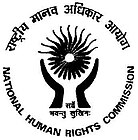National Human Rights Commission of India
|
National Human Rights Commission राष्ट्रीय मानवाधिकार आयोग |
|
|---|---|

national human rights commission logo
|
|
| Agency overview | |
| Formed | 12th October 1993 |
| Legal personality | Governmental: Government agency |
| Jurisdictional structure | |
| Federal agency | India |
| General nature |
|
| Operational structure | |
| Headquarters | New Delhi, India |
| Agency executives |
|
| Website | |
| Official website | |
The Rights Commission (NHRC) of India is an autonomous public body constituted on 12 October 1993 under the Protection of Human Rights Ordinance of 28 September 1993. It was given a statutory basis by the Protection of Human Rights Act, 1993 (TPHRA). The NHRC is the National Human Rights Commission of India, responsible for the protection and promotion of human rights, defined by the Act as "rights relating to life, liberty, equality and dignity of the individual guaranteed by the Constitution or embodied in the International Covenants".
"Human Rights" means the rights relating to life, liberty, equality and dignity of the individual guaranteed by the constitution or embodied in the International covenants and enforceable by courts in India. "Commission" means the National Human Rights Commission constituted under section of All human beings are born free and equal in dignity and rights known as Human rights, as commonly understood, are the rights that every human being is entitled to enjoy freely irrespective of his religion, race, caste, sex and nationality, etc. (Jagdish chand, 2007) In Declaration of Independence acknowledged the fundamental human rights. Human right means different thing to different people. Human Rights are not static. New rights are recognized and enforced from time to time. Only persons fully conversant with the latest development about the expanding horizons of Human Rights can promote their awareness better than others.
TPHRA mandates the NHRC to perform the following functions:
The NHRC consists of:
The sitting Judge of the Supreme Court or sitting Chief Justice of any High Court can be appointed only after the consultation with the Chief Justice of Supreme Court.
The chairman of the NHRC is Justice H. L. Dattu and the other members are:
Ex-officio members:
A State Government may constitute a body known as the Human Rights Commission of that State to exercise the powers conferred upon, and to perform the functions assigned to, a State Commission. In accordance to the amendment brought in TPHRA,1993 point No.10 below is the list of State Human Rights Commissions formed to perform the functions of the commission as stated under chapter V of TPHRA,1993 (with amendment act 2006). At present, 24 states have constituted SHRC
Sections 3 and 4 of TPHRA lay down the rules for appointment to the NHRC. The Chairperson and members of the NHRC are appointed by the President of India, on the recommendation of a committee consisting of:
The NHRC has been accredited with "A status" by the International Coordinating Committee of National Human Rights Institutions (the ICC), indicating that it is in conformity with the Paris Principles – a broad set of principles agreed upon by a conference of experts on the promotion and protection of human rights, in Paris in October 1991, and subsequently endorsed by the UN General Assembly. The Commission is thus entitled to participate in the ICC and in its regional sub-group, the Asia Pacific Forum, and may take part in certain sessions of the UN human rights committees.
...
Wikipedia
